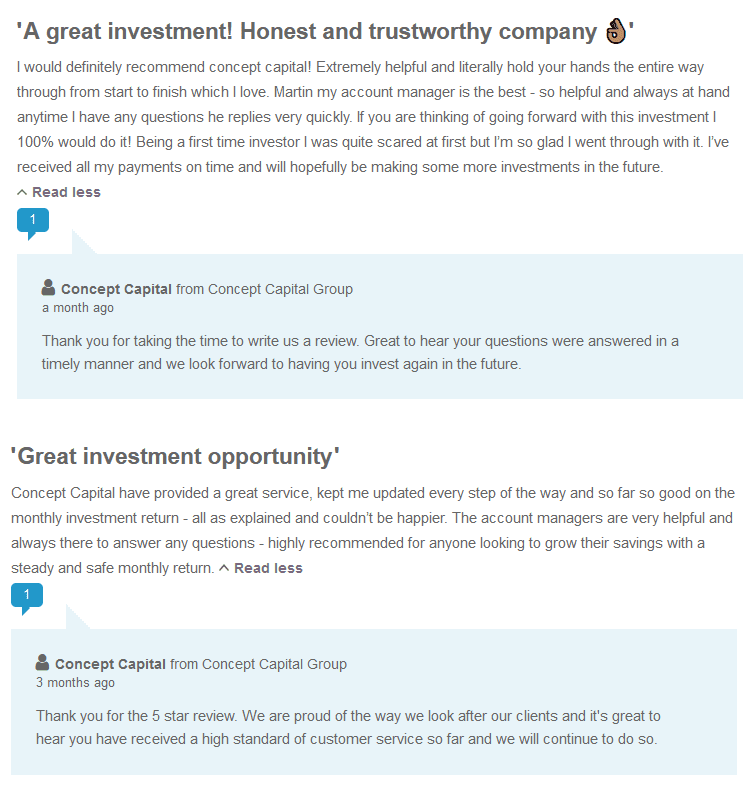At time of writing Marshbell offers the following investment terms:
- Silver: 4.65%pa paid monthly for a 1 year investment
- Gold: 8.4%pa paid monthly for a 2 year investment
- Platinum: 12.8% paid monthly for a 3 year investment
- Bronze: 10.2% rolled up and paid at maturity for a 2 year investment
In November 2020 third party introducers for Marshbell were advertising an investment via Facebook and Instagram paying 13.5% per year. Specifics of the investment term were not provided.
Third-party introducers for Marshbell claimed via Instagram that Marshbell offers “Full asset protection” and “Zero defaults on loan book”. For more on these claims see below.
Who are Marshbell?
No details of who is behind Marshbell are disclosed on their website.
Companies House shows that Marshbell is owned by director Stewart Paterson.
I wasn’t able to find any history for Paterson. There’s a Stewart Paterson with the same month and year of birth in the investment (and male modelling) industry, but there’s no mention of Marshbell on his LinkedIn and I wasn’t able to find confirmation they are the same person. (Marshbell’s lack of disclosure on their website doesn’t help.)
Although Marshbell claims to have been “Debt finance specialists since 2016”, and the company was indeed incorporated that year, Marshbell’s accounts show that it was dormant until some point between October 2017 and 2018. Moreover, Paterson only took over the company in January 2020. Prior to that the company was wholly owned by a David Shapiro until January 2020 and a Ceri John until November 2018.
Those October 2018 accounts show that the company took in about £6 million of capital in the previous year and little else. They were unaudited and are therefore worthless for due diligence purposes without independent verification.
How safe is the investment?
Third-party introducers for Marshbell claim their investments offer “Full asset protection” and they have had “Zero defaults on loan book”. Marshbell itself claims on its website to be “Fully secured”.
Nonetheless, like any unregulated investment which previously paid 13.5% per year, this is an inherently high risk investment with an inherent risk of total loss.
Marshbell having “zero defaults” to date does not change this, especially given its young age.
Marshbell’s website states “Marshbell Group would preferably deploy capital on a joint venture basis with an existing business, targeting an annual return of 8% net, after paying all investors that may have subscribed via Marshbell’s investment instruments.”
Given this requires it to target an return of at least 21.5% per year (8% + 13.5% plus Marshbell’s other costs) it will need to lend to high risk borrowers willing to pay such interest rates.
Secured lending is not risk-free as there is a risk that if the underlying borrower defaults, the security cannot be sold for enough to cover the loan.
Investors in asset-backed loans have been known to lose 100% of their money when it turned out that there were not enough assets left to pay investors after paying the insolvency administrator (who always stands first in the queue).
This is not in any sense to imply that the same will happen to investors in Marshbell, only illustrating the risk that is inherent in any loan note even when it is a secured loan.
If investors plan to rely on this security, it is essential that they hire professional due diligence specialists (working for themselves, not Marshbell) to confirm that in the event of a default, the assets of Marshbell would be valuable and liquid enough to compensate all investors. Investors should not simply rely on what Marshbell tells them about their assets.
The dramatic difference between the different investment terms is cause for concern. Normally you would expect to see a percent or two difference between investment terms. It is not clear why the chance of Marshbell failing in year 3 so much higher than the chance of it failing in year 1 that it needs to offer a whole 8% more in annual interest.
Should I invest in Marshbell?
This blog does not give financial advice. The following are statements of publicly available facts or widely accepted investment principles, not a personalised recommendation. Investors should consult a regulated independent financial adviser if they are in any doubt.
As with any investment in an unlisted micro-cap company, this investment is only suitable for sophisticated and/or high net worth investors who have a substantial existing portfolio and are prepared to risk 100% loss of their money.
Any investment offering returns of up to 12.8% per year is inherently high risk. As an individual, illiquid security with a risk of total and permanent loss, Marshbell’s loan notes are much higher risk than a mainstream diversified stockmarket fund.
Before investing investors should ask themselves:
- How would I feel if the investment defaulted and I lost 100% of my money?
- Do I have a sufficiently large portfolio that the loss of 100% of my investment would not damage me financially?
- Have I conducted due diligence to ensure the “asset security” can be relied on?
If you are looking for a “protected” investment, you should not invest in loans to unregulated companies with a risk of 100% loss.














